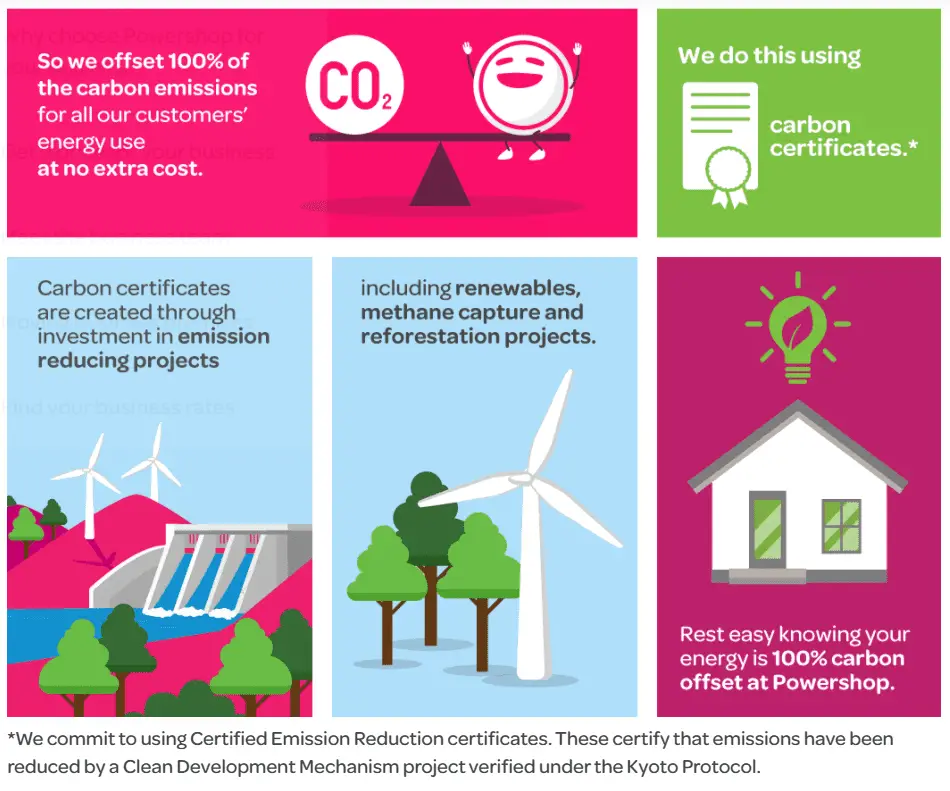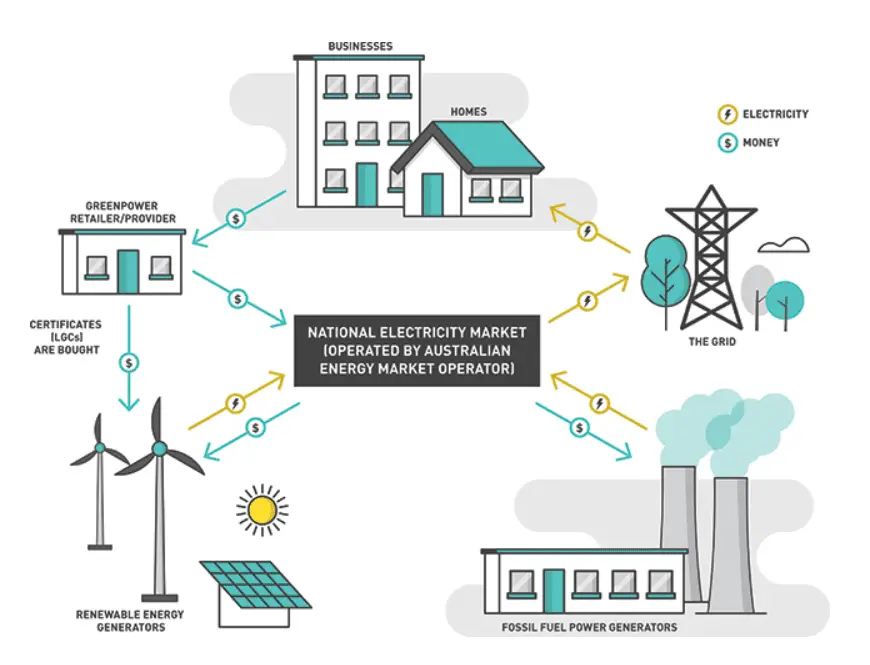Is Carbon-Neutral Energy Plans and GreenPower Greenwashing?

So bottom line – I sometimes feel that the terms “carbon neutral” and “GreenPower” are being used as a smokescreen – as a way to greenwash a company that, on the whole, is engaged in environmentally disruptive behaviour. That aside, these products have their place and should be something to look out for.
Before I expand on that, let me explain what I know about the terms “carbon neutral” and “GreenPower”.
Carbon neutral energy plans
A carbon-neutral energy plan works like this – you still get your energy from the grid, which has energy from both renewable and non-renewable sources (i.e. energy from burning fossil fuels). But then your energy retailer will calculate the amount of carbon released as a result of your energy use and then purchase equivalent carbon credits to cover those emissions (1).
Here is a visual representation of the idea from the energy retailer Powershop (2):

The carbon credits/ certificates are purchased from certified sustainability projects across the globe and support a range of activities that result in negative emissions. As noted by Canstar Blue “This can include anything from renewable power developments to land management and tree planting” (3).
It seems most of the certificates/ carbon credits come from those approved by Climate Active (4). Climate Active is a joint Australian Government and business initiative. I have to admit, their website left me confused and I am none the wiser about how the scheme works. From what I can gather, Climate Active has a standard that companies need to follow when they are purchasing carbon credits. The type of credits that are approved under the standard are: Australian Carbon Credit Units (ACCUs), Certified Emissions Reductions (CERs), Verified Emissions Reductions (VERs), Removal Units (RMUs) and Verified Carbon Units (VCUs) (5).
A whole lot of acronyms there, which can be very intimidating for a customer just trying to find out more information! But essentially there are projects around the world that have negative emissions. They can work out how much carbon they remove from the atmosphere using different units (like the ones mentioned) and then sell these units/ carbon credits to interested parties. How the price is determined and how much money this brings to those selling these units I have no idea! But that’s how it works.
So a lot of energy retailers purchase these credits, at an amount equivalent to their customer’s usage. As a result, they can say that the energy plans they offer are “carbon neutral” (4).
Essentially all the major retailers offer carbon-neutral products, usually at no extra cost to the consumer or at a very minimal cost to the customer. Although the cost may be incorporated in the standard costs for the plan (9).
GreenPower Energy Plans
The credits/ certificates purchased under a “carbon neutral” energy plan can relate to projects all around the world – not necessarily in Australia and not necessarily projects that directly invest in green energy.
To address this, there is a similar product available in the energy retail market called GreenPower.
GreenPower is another government-accredited scheme and it works just like carbon-neutral plans – but this time energy companies buy ‘certificates’ generated by Australian based renewable energy sources which they then use to offset the energy their customers have used from the grid (6).
Again, by signing onto GreenPower energy plans, you aren’t getting renewable energy fed to your house – that is just not possible. Instead, renewable energy is “added to the grid on your behalf” (7). The amount “added” is equivalent to the amount of energy you have used.
GreenPower is usually offered at different rates – you can choose to have all of your energy offset using GreenPower (100%) or a portion of your energy bill can be offset using GreenPower.
Here’s a diagram that demonstrates the process (7):

How well this system supports/ encourages the renewable energy market is debatable it seems. As noted in a review done by Canstar: “The program is so small, however, that it is unlikely to make the difference when a generator is deciding whether to install new renewable energy.” (7) Canstar also notes: “The GreenPower Program Review reports that the program contributed 8.6% of the growth in renewable energy generated over the period 1997-2013. The rest of the growth was driven by the mandatory requirements under the government’s Renewable Energy Target and other incentive programs” (7).
GreenPower can cost you a fair bit as a consumer – it can increase your household electricity bill by 20-50%. The range depends upon the retailer’s rates and the proportion of your energy bill that will be offset by GreenPower (i.e. 10%, 50% or 100%) (7).
Is this greenwashing?
Yes and no.
It all depends on how it’s marketed and how people perceive the marketing.
When I was looking into the three big energy retailers (Energy Australia, AGL and Origin), who are also the biggest emitters of greenhouse gas in Australia, I was annoyed that they were able to market themselves as offering carbon-neutral products. The biggest emitters of greenhouse gases could say they offer carbon-neutral products?!
Which is completely true, they do.
But those that are none the wiser may think these companies themselves are carbon neutral when that is far from the case. Only the carbon associated with the energy customers generate is offset. Meanwhile, in the energy generation arm of these businesses, they are running coal fire or gas-generated energy plants and spewing out carbon and methane as they have always done, in order to add energy to the grid for all to use. All the while taking the profits made from your business to help them to do this.
So my issue is not with carbon-neutral plans and GreenPower as a concept – but mainly with how the three big energy retailers use these plans to position themselves as sustainable when in reality their operations are anything but sustainable.
Does signing up for a carbon-neutral and GreenPower energy plan mean you are supporting the renewable energy market?
No, a carbon-neutral plan does not mean you are supporting the renewable energy market. If you are on a carbon-neutral plan, your energy still comes from the grid, which has energy from a mixture of sources. All that has happened is that there is now someone out there in the world planting more trees or producing renewable energy off the back of your energy use. Not a bad thing. As long as you keep in mind that fossil fuels were burnt to produce your energy. Which is an inescapable fact for most of us in Australia.
GreenPower is a little different because at least your emissions are offset by direct investment into the renewable energy market – so if your goal is to support green energy, this is one step close than carbon neutral products alone.
However, GreenPower does cost more and you would want to weigh up whether the extra cost is worth it. Because keep in mind, GreenPower plans only “neutralises” carbon emissions associated with your energy use – the inescapable fact is, fossil fuels were burnt to produce your energy. There seems to be no escaping that unless the energy generators (like AGL, Origin and Energy Australia) change the way they generate electricity.
Are you focused on carbon-neutral products or Greenpower or neither?
In my search for a new energy retailer, I am not focused on companies that offer GreenPower – I personally don’t want to be paying extra on my electricity bills. Even if that extra means that it could help support the Australian renewable energy market (in a small but still measurable way).
Just have to be honest and say that this is where I am at.
I am focused on moving away from a retailer that generates electricity from fossil fuels (AGL) to one that has no part in that market. And I suspect that change alone may cost us a little extra. I can’t be adding the cost of GreenPower onto that.
Taking my long term business away from fossil fuel companies is where I think I can use my purchasing power to make a small impact – GreenPower does not factor into that.
But since carbon-neutral products are offered by many retailers and there are essentially offered at no extra cost (it seems), I will definitely be looking out for an energy plan that is carbon neutral. It’s a great concept.
References:




